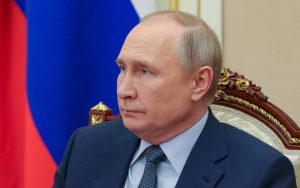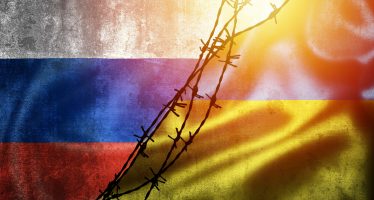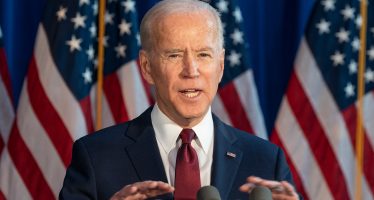Power Meets Pluck: Paranoid and Haunted, President Putin Sees Nazis Everywhere

President: Vladimir Putin
In President Vladimir Putin’s book everybody not excitedly cheering his ‘special military operation’ to liberate Ukraine is a Nazi. If the Russian press is believed, the worse of the lot are to be found in Finland and Sweden as those countries mull joining NATO – the new disguise of the Axis Powers.
That blonde on platform shoes from Abba? A dancing Nazi. King Carl Gustav XVI? A royal Nazi. Prime Minister Sanna Marin of Finland? A closet Nazi. Her counterpart in Sweden Magdalena Andersson? A wannabe Nazi. The European Union? A conference of Nazis; and, of course, a thoroughly evil collective supporting its Ukrainian co-conspirator and Über Nazi Volodymyr Zelensky.
Mr Putin’s obsession with Nazis echoes the Red Scares of the 1910s and 1950s when Americans – and to a lesser extent Europeans – saw bloodthirsty communists lurking under beds, behind trees, and in attics. That irrational fear fuelled the Cold War just as the present fixation of the Russian president stokes the hot war.
Looking in from afar, it is almost impossible to understand the reasoning, if any, behind Mr Putin’s actions and thoughts. He seems to have achieved the exact opposite of the outcome he anticipated or desired.
Churchillian
Ukraine sprang a surprise, refused to follow Moscow’s script, and did not roll over when it was supposed to – right after the first salvo was fired. Its president did not whimper and flee in the face of an apparently almighty opponent. Instead, he morphed into a Churchillian giant, brilliantly inspiring the nation with his personal courage and determination. President Zelensky’s attitude, gestures, and words will be analysed, studied, and dissected by countless future generations of marketing and PR professionals.
The Ukrainian people, including native Russian-speakers, rose as one to defend the homeland with Molotov cocktails, hunting rifles, pitchforks, and whatever else could be thrown at the invaders. Instead of bread and salt, Russian ‘liberators’ were offered sunflower seeds so that beauty could grow out of their corpses. A formerly rather downtrodden nation was transformed almost overnight into one bursting with optimism, resolve, and confidence.
Nobody, least of all Mr Putin, saw that coming. The Russian president also seriously underestimated the West’s adoration of the underdog. Whilst he admires power, the West admires pluck.
Remarkably, there has been very little discussion over the question if Ukraine is worthy of support. The question did not even arise. It was a cut and dried given that the country suffering aggression must be assisted lest the emboldened invader turns a corner and heads west.
Preposterous
The Kremlin’s own excuses for moving into its neighbour – after denying for months on end that it harboured no such designs – were too preposterous to entertain or merit an answer. In this war, the good guys are easily distinguished from the bad ones. There is no ambiguity at all. Even Switzerland suspended its state religion to pick a side. The understandably war-shy Germans broke with precedent and decided to ship heavy artillery eastwards – and invest €100bn in their own armed forces.
Instead of driving a wedge deep into NATO, the invasion pulled the alliance together and reinvigorated it. Suddenly, that Cold War relic went from a being sleepy, boring, and slightly awkward construct to the mighty cornerstone of our common defence. With the sole exception of Belarus, all of Russia’s western neighbours are clamouring to be let in and bask peacefully and securely under the Article 5 all-for-one umbrella.
It must be particularly frustrating for President Putin to note that Finland and Sweden are immune to his empty (nuclear) threats and now ready to be fast-tracked into NATO. This profoundly chances the Nordic geopolitical reality. In Helsinki, Stockholm, and elsewhere, Russian intimations are mostly met with a retort along the lines of ‘you and what army?’
Finland shares a 1,300km-long border with Russia and will add considerable resolve and firepower to NATO. It can readily mobilise an exceptionally well-trained and well-equipped army of some 280,000. With over 800 pieces of heavy artillery in its arsenal, plus 200 Leopard II battle tanks upgraded to the highest standard, Finland has little to fear from its blustering neighbour. According to former Prime Minister Alexander Stubb, the country’s NATO accession provides not only a solid backstop but also affirms its formal abandonment of Russian- (Soviet-) imposed neutrality.
Mr Stubb called Russia’s unprovoked attack on Ukraine a “tactical and strategic blunder” which convinced both Finns and Swedes that realpolitik demanded seeking shelter in NATO: “For both countries, membership of the alliance is a no-brainer on all counts and a win-win for the Baltic Sea region as a whole.”
Immersed deep in a quagmire of his own making, and without a face-saving way to climb out, President Putin seems to be preparing for a long war of attrition. That was the considered assessment given to US lawmakers on Tuesday by Avril Haines, Director of National Intelligence.
Resilience
Mr Haines does not expect the Kremlin to be satisfied with capturing the Donbass and its two breakaway pseudo-republics. He warned that Russian leadership may be counting on the country’s greater willingness to sustain losses and endure hardship for longer than its adversaries. In this reading, the resolve of the US and EU may weaken as inflation takes it toll, energy prices spike, and the war drags on.
This is decidedly not how Ukraine Foreign Minister Dmytro Kuleba expects the war to unfold. Confidence is growing that the country may ultimately be victorious and eject Russian forces from its territory – including Crimea. Earlier this week, Mr Kuleba said that the “picture of victory is an evolving concept” and added that pushing the Russians out of the Donbass region would enable Ukraine to retake Crimea as well. Kyiv wants everything back – including the kitchen sink.
Mr Kuleba expressed confidence that Ukraine’s newfound allies would back the country “all the way” and said that deliveries of heavy artillery were gathering steam and would provide the military with the firepower needed to push back Russia’s recent advances.
The foreign minister was equally sanguine over his country’s prospects of joining the European Union: “Just three months ago, Ukraine did not even have a membership perspective. Now they are discussing how long the accession would take.” In June, EU leaders will decide if Ukraine is to be awarded membership candidate status and gain admittance to the crowded antechamber of the union.
Mr Kuleba was somewhat less excited over the proposal of President Emmanuel Macron of France for the creation of an associate membership category – a sort of EU Light – for promising aspirant and repentant former member states. “We want full membership asap,” said Mr Kuleba, explaining that Ukraine is the only country where people fight and die for European values.
You may have an interest in also reading…
Markets in Turmoil: President Putin’s ‘Technical Operations’ Upset the Apple Cart
In the early morning of Thursday, Russian missiles rained down on Ukrainian military installations as markets in the far East
Northern Ireland Shilly-Shally has Experts Fearful of New Trade War
The UK’s disentanglement from the European Union has been a source of instability in international trade, and is now giving
Joe Biden No Panacea to Global Trade Troubles
The imminent departure from the White House of the self-styled dragon-slayer does not necessarily bode well for Chinese President Xi


















































































